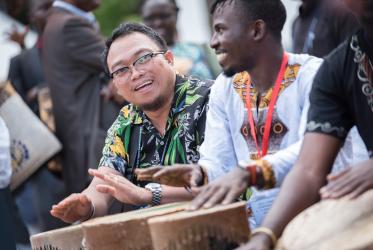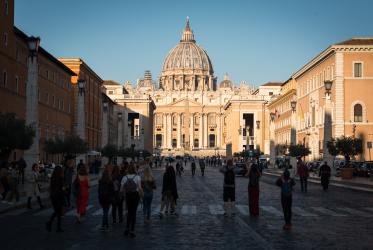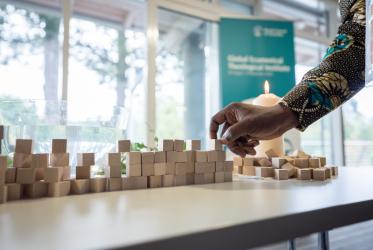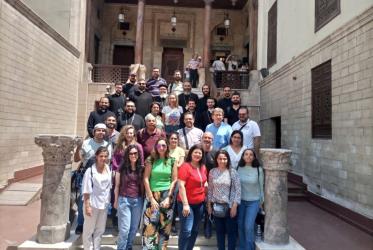Six committed ecumenists, each with significant experience in specific fields of ecumenical endeavour, have been appointed to take up key leadership roles within the Geneva-based World Council of Churches (WCC). The newly appointed staff members will head five programmes plus a planning and integration office, all of which are the result of programmatic reshaping following the WCC 9th Assembly in 2006.
The newly appointed WCC directors are: Rev. Dr Hielke Wolters (Justice, Diakonia and Responsibility for Creation); Mr Mark Edward Beach (Communications); Rev. Dr Martin Robra (WCC and the Ecumenical Movement in the 21st century); Rev. Jacques Matthey (Unity, Mission, Evangelism and Spirituality); and Dr Aruna Gnanadason (Planning and Integration). The director of the WCC programme on Education and Ecumenical Formation, Fr Prof. Ioan Sauca, was appointed last year.
Wolters and Beach will be leaving positions in their own countries to come to the Council, whereas Sauca, Robra, Matthey and Gnanadason are already on WCC staff.
Rev. Dr Hielke Wolters,
from the Protestant Church in the Netherlands,is a theologian and pastor engaged in work on social justice, interreligious dialogue and development. His doctoral work in India focused on the social and ecumenical doctrines of the late Indian theologian M.M. Thomas. After working as a pastor in both rural and urban settings in Holland, and later as director of the Dutch national ecumenical office for industrial and rural mission, he was appointed director of Stichting Oikos - an ecumenical institute that assists churches to develop public awareness in the areas of international cooperation and sustainable development.
The WCC programme on Justice, Diakonia and Responsibility for Creation is designed to support churches' efforts to meet human need, combat injustice, and threats to creation. In particular, it will help support and strengthen churches' work with uprooted people, on health and healing, climate change, water, energy, nuclear concerns, and the use/misuse of new technologies.
Wolters brings solid experience in combining theological reflection with result-oriented project management skills to the Council. The main programme challenge, he says, will be to develop creative initiatives that can give hope to those fighting for survival on a daily basis; to promote solidarity between churches in spite of divisions due to economic globalization; and to support movements and initiatives promoting sustainable development in order to counter the effects of climate change.
Mr Mark Edward Beach,
a US Mennonite, brings 25 years of experience in communications strategic planning, management and supervision to his new post in the WCC. An accomplished and award-winning news and feature writer for public and church media, he has also worked extensively in photo journalism and editing, and video production. He moves to the WCC from his current position as director of communications of the Mennonite Central Committee - the international relief, development and peace agency of the Mennonite and Brethren in Christ churches of North America.
The WCC programme on Communication: giving voice and witness in the world has the task of making the work of the Council as well as the life and work of its member churches visible, and bringing the ethical and moral alternative voice of the churches and the ecumenical movement to the world.
Beach's extensive experience in telling the stories of people's lives - of individuals, families or Christian communities - to church audiences via a broad range of media channels will help the WCC to build relationships, which he sees as a vital function of the Council. According to Beach, one of the challenges for WCC communications is the divide between those who have access to modern communications technologies and those who do not, and how to bridge it.
Rev. Dr Martin Robra,
a theologian and pastor from the Evangelical Church in Germany, joined the WCC in 1994. He has been responsible for the Council's work on ethics and ecology. This includes oversight of its programme on climate change, an ecumenical water network, and activities on genetic engineering and nanotechnology. Under his guidance, considerable efforts were made to galvanize churches' support for the UN Framework Convention on Climate Change, and the Kyoto Protocol. He also contributed from an ethical perspective to other work by the former Justice, Peace and Creation team, and was involved in common projects with such areas of the Council's work as Faith and Order, and Diakonia and Solidarity.
The new programme on the WCC and the Ecumenical Movement in the 21st century will focus on nurturing ecumenical relationships among member churches and with ecumenical partners; interpreting and communicating the ecumenical vision, and facilitating theological analysis of 21st-century ecumenical challenges. Through this work, the coherence of the whole ecumenical movement will be fostered.
Rev. Jacques Matthey,
aSwiss theologian and pastor, came to the WCC in 1999, bringing with him 18 years of experience as staff and then general secretary of the mission department of the Protestant churches of French-speaking Switzerland. As head of the WCC's desk on mission and evangelism, he was responsible for the thematic agenda of the 2005 World Conference on World Mission and Evangelism - a role for which he was specially qualified, having been involved in three previous world mission conferences (Bangkok 1973, San Antonio 1989, and Salvador de Bahia 1996) and organised a fourth one (Melbourne 1980).
The new WCC programme on Unity, Mission, Evangelism and Spirituality will encourage churches to develop agreed positions on issues that divide them and pursue their dialogue on the nature and mission of the church; overcome exclusion and discrimination in church and society; study how to hold commitment to unity together with mission and evangelism; and explore traditional and newer dimensions of spirituality in ecumenism.
Fr Prof. Ioan Sauca
is a theologian and priest in the Orthodox Church of Romania with a special interest in mission and spirituality, interfaith dialogue, ecumenical formation and inter-confessional encounters. After teaching mission and ecumenism, he took charge of ecumenical and church relations, communication and theological education within the Romanian Orthodox patriarchate. Coming to the WCC in 1994, he was responsible for Orthodox studies and relationships in mission, and was later appointed as missiology professor at the Ecumenical Institute at Bossey - the international centre for encounter, dialogue and formation of the WCC. In 2001, he became the director of the Institute.
The WCC programme on Education and Ecumenical Formation will support efforts in the field of ecumenical and faith formation, and also provide formation at the Ecumenical Institute. In supporting the churches' education/formation work, it will create educational practitioners' networks; identify training/education needs and offer scholarships; develop and share curricula; and maintain an ecumenical library and archives.
Dr Aruna Gnanadason,
a member of the Church of South India,is an Asian theologian who came to the WCC in 1991 from the National Council of Churches in India. An advocate for justice and for women's rights in church and society, she worked to build the Indian women's movement in the church, and to help church women relate to secular women's movements. In the WCC, she was responsible for the 1988-1998 Ecumenical Decade of Churches in Solidarity with Women, supported the participation of women in all aspects of the WCC's life, and worked to ensure that their perspectives and visions were included in its programmatic work. She also coordinated the WCC's Justice, Peace and Creation department between its 8th and 9th assemblies.
The WCC Planning and Integration office will provide tools for developing, monitoring, evaluating and reporting on programme and management plans. It will monitor the follow-up of policy decisions, and ensure consistent programmatic working relationships with member churches and ecumenical partners. It will encourage integration between programmes, management, relationships and communication, and work to ensure that the WCC is a learning organization.
The positions of director of programmes on Public Witness and on Interreligious Dialogue and Cooperation are still open.
In relation to churches' concerns on violence, war, peace, human rights, economic injustice, poverty, and exclusion, the WCC Programme on Public witness: addressing power and affirming peace will advocate at the UN and other global fora, as well as accompany and bring churches together to reflect on and effectively respond to critical situations, especially in the Middle East and against violence through the Decade to Overcome Violence. Programmatic work receives guidance from the Commission of the Churches on International Affairs (CCIA).
In order to contribute to the promotion of harmonious coexistence and peaceful cooperation in pluralistic societies, the WCC Programme on Inter-religious dialogue and cooperation will enable bilateral dialogues, regional and cross-cultural encounters on perceptions of "the other" and on issues such as conversion; will engage churches in reflections on what it means to be Christian in a world of many religions; and will accompany and equip the churches for advocacy in countries where religion is at the centre of conflicts.





